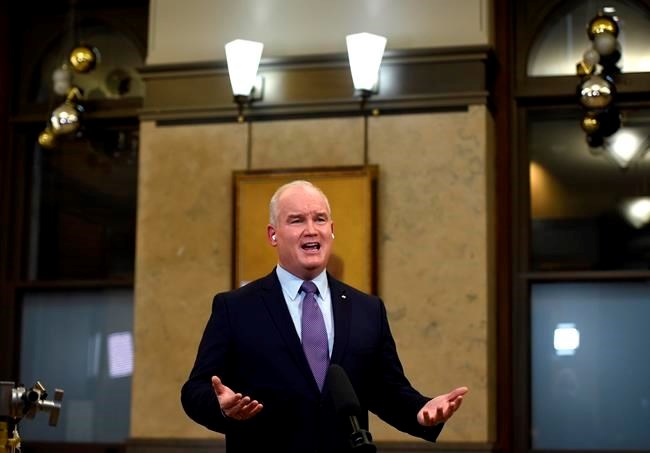OTTAWA — Conservative Leader Erin O'Toole is urging Prime Minister Justin Trudeau to amend a government bill on assisted dying to better protect Canadians with disabilities.
But Trudeau says he thinks the government has struck the right balance between allowing people who are suffering unbearably to seek medical help to end their lives and protecting vulnerable individuals from coercion.
O'Toole contends the government has not struck the right balance and has ignored the concerns of disability rights groups.
The exchange between the two leaders in the House of Commons came just as the government agreed to extend debate on Bill C-7 to give Conservative MPs more time to air their objections, even as the court-imposed deadline of Dec. 18 looms.
The government had hoped to wrap up debate last Monday, with a final vote Tuesday, so that the bill could then be dealt with by the Senate before the deadline.
But Conservatives have been talking out the clock and the bill is now at least a week behind schedule.
Report-stage debate on the bill resumed Wednesday, with the government agreeing to extend the debate by four hours until about midnight.
The House of Commons is to vote on the justice committee's report on the bill, as well as two proposed Conservative amendments to it, on Thursday.
However, the House must still debate the bill at third reading and put it to a final vote. There was no indication Wednesday when that might occur or how long it will take.
Nor is there any guarantee the Senate will pass the bill quickly. The upper house's legal and constitutional affairs committee has been conducting a pre-study of the bill before it passes the Commons and it has exposed deep divisions among senators, some of whom believe it is unconstitutional.
The bill is meant to bring the law into compliance with a Quebec Superior Court ruling last fall, which struck down a provision in the law allowing assisted dying only for Canadians whose natural death was reasonably foreseeable.
It would make it easier for those near death to receive medical assistance in dying but would set up more restrictive requirements for those not near death.
The court ruling was prompted by individuals with disabilities fighting for their right to end their suffering with medical help. But disability rights groups have condemned the bill, contending it sends a message that the lives of people with disabilities are not worth living.
On Wednesday, O'Toole urged Trudeau to "heed the advice of so many Canadians" and to amend the bill "to protect the most vulnerable."
"Bill C-7 does not strike the right balance," he argued during question period in the Commons.
Trudeau responded that the bill is "meant to ensure people who are suffering unbearable pain have the choice of a peaceful death" while adding safeguards to "to protect vulnerable persons from pressure and coercion and ensure that medical assistance in dying is always an informed and voluntary choice."
He conceded "it is a difficult balance to strike" but said he believes the government has found the right balance.
This report by The Canadian Press was first published Dec. 2, 2020.
Joan Bryden, The Canadian Press



